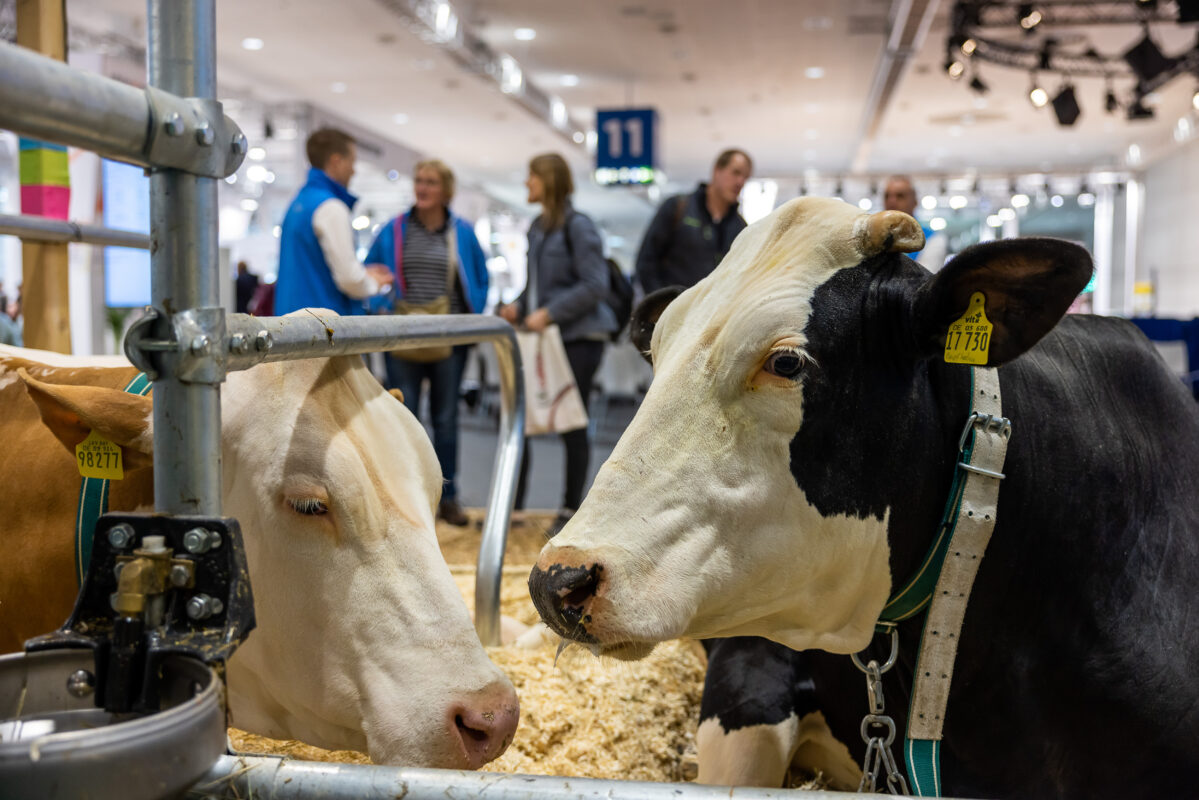
Latest NEWS
Revolutionizing Livestock Agriculture: Discovering the Top 5 Key Trends at EuroTier Hanover 2024

EuroTier Hanover 2024: Unveiling the Latest Trends in Revolutionizing Livestock Agriculture
EuroTier Hanover 2024: Unveiling the Latest Trends in Revolutionizing Livestock Agriculture

The first trend is precision livestock farming. This innovative approach utilizes advanced technologies such as sensors, data analytics, and automation to monitor and manage livestock production. By collecting real-time data on animal health, behavior, and performance, farmers can make informed decisions to optimize productivity and animal welfare. Precision livestock farming not only improves efficiency but also reduces environmental impact by minimizing resource wastage.
The second trend is alternative protein sources. As the demand for animal-based protein continues to rise, there is a growing interest in alternative protein sources. EuroTier Hanover 2024 showcases various innovative solutions, including plant-based proteins, insect-based proteins, and lab-grown meats. These alternatives not only offer a sustainable and ethical option but also provide new opportunities for farmers to diversify their production and meet changing consumer preferences.
The third trend is animal welfare and sustainability. Consumers are increasingly concerned about the welfare of animals and the environmental impact of livestock production. EuroTier Hanover 2024 highlights the latest advancements in animal welfare practices, such as improved housing systems, enriched environments, and enhanced health management. Additionally, sustainable farming practices, such as reducing greenhouse gas emissions and optimizing resource utilization, are gaining traction in the industry.
The fourth trend is digitalization and connectivity. With the advent of the Internet of Things (IoT) and artificial intelligence (AI), the livestock industry is undergoing a digital transformation. EuroTier Hanover 2024 showcases cutting-edge technologies that enable farmers to remotely monitor and control various aspects of their operations. From automated feeding systems to smart barns, digitalization improves efficiency, reduces labor costs, and enhances overall productivity.
The fifth trend is biosecurity and disease prevention. Livestock diseases can have devastating consequences, both economically and in terms of animal welfare. EuroTier Hanover 2024 highlights the importance of biosecurity measures, such as strict hygiene protocols, vaccination programs, and early disease detection systems. By implementing robust biosecurity practices, farmers can minimize the risk of disease outbreaks and ensure the health and well-being of their livestock.
In conclusion, EuroTier Hanover 2024 is a platform that showcases the latest trends in revolutionizing livestock agriculture. Precision livestock farming, alternative protein sources, animal welfare and sustainability, digitalization and connectivity, and biosecurity and disease prevention are the key trends that are shaping the future of the industry. By embracing these trends, farmers can improve productivity, meet consumer demands, and contribute to a more sustainable and ethical food system. EuroTier Hanover 2024 serves as a catalyst for innovation and collaboration, driving the livestock industry towards a brighter and more prosperous future.
Exploring the Potential of Precision Livestock Farming and Smart Animal Management at EuroTier Hanover 2024
Revolutionizing Livestock Agriculture: Discovering the Top 5 Key Trends at EuroTier Hanover 2024
EuroTier Hanover 2024, the world’s leading trade fair for animal production, promises to be a game-changer in the field of livestock agriculture. With a focus on precision livestock farming and smart animal management, this event is set to unveil the latest advancements and trends that will shape the future of the industry. In this article, we will explore the potential of these innovations and highlight the top five key trends that are expected to dominate EuroTier Hanover 2024.
First and foremost, precision livestock farming is revolutionizing the way animals are managed and monitored. This approach utilizes cutting-edge technologies such as sensors, data analytics, and artificial intelligence to optimize animal health and welfare. By collecting real-time data on factors like feed intake, behavior, and health indicators, farmers can make informed decisions and intervene promptly when necessary. EuroTier Hanover 2024 will showcase the latest advancements in precision livestock farming, demonstrating how these technologies can improve productivity, reduce costs, and enhance animal welfare.
Another key trend at EuroTier Hanover 2024 is the integration of smart animal management systems. These systems leverage the power of automation and connectivity to streamline various aspects of livestock farming. From automated feeding and watering systems to robotic milking and cleaning, smart animal management solutions are designed to increase efficiency and reduce labor-intensive tasks. By freeing up farmers’ time and resources, these technologies enable them to focus on more critical aspects of their operations, ultimately leading to improved productivity and profitability.
In addition to precision livestock farming and smart animal management, EuroTier Hanover 2024 will also highlight the importance of biosecurity in livestock agriculture. With the increasing threat of diseases and pathogens, implementing robust biosecurity measures is crucial to safeguard animal health and prevent outbreaks. The trade fair will showcase innovative solutions such as disinfection systems, biosecurity protocols, and disease surveillance technologies. By adopting these measures, farmers can minimize the risk of disease transmission and protect their livestock from potential threats.
Furthermore, EuroTier Hanover 2024 will shed light on the growing trend of sustainable livestock farming. With the rising global demand for food and the need to reduce environmental impact, farmers are increasingly embracing sustainable practices. This includes implementing renewable energy sources, optimizing resource utilization, and reducing greenhouse gas emissions. The trade fair will showcase eco-friendly technologies and practices that promote sustainable livestock production, demonstrating how these approaches can contribute to a more environmentally friendly and socially responsible industry.
Last but not least, EuroTier Hanover 2024 will emphasize the importance of animal welfare in livestock agriculture. As consumers become more conscious of the origins of their food and the treatment of animals, ensuring high standards of animal welfare has become a top priority for farmers. The trade fair will showcase advancements in animal housing, handling, and transport, highlighting how these innovations can enhance animal well-being and meet consumer expectations. By prioritizing animal welfare, farmers can not only improve the quality of their products but also build trust and loyalty with consumers.
In conclusion, EuroTier Hanover 2024 is set to revolutionize livestock agriculture by showcasing the latest trends and innovations in precision livestock farming and smart animal management. From the integration of cutting-edge technologies to the emphasis on sustainability and animal welfare, this trade fair will provide valuable insights into the future of the industry. By embracing these trends, farmers can enhance productivity, reduce costs, and meet the evolving demands of consumers. EuroTier Hanover 2024 is undoubtedly a must-attend event for anyone involved in the livestock agriculture sector.
Digitalization and Automation in Animal Husbandry: A Game-Changer in Livestock Agriculture at EuroTier Hanover 2024
Digitalization and Automation in Animal Husbandry: A Game-Changer in Livestock Agriculture at EuroTier Hanover 2024
In recent years, the agricultural industry has witnessed a significant transformation with the advent of digitalization and automation. These technological advancements have revolutionized the way livestock agriculture is conducted, leading to increased efficiency, improved animal welfare, and enhanced productivity. EuroTier Hanover 2024, the world’s leading trade fair for animal production, showcased the top five key trends in digitalization and automation that are set to shape the future of livestock agriculture.
One of the most prominent trends at EuroTier Hanover 2024 was the integration of smart sensors and data analytics in animal husbandry. These technologies enable farmers to monitor various parameters such as temperature, humidity, and feed consumption in real-time. By collecting and analyzing this data, farmers can make informed decisions regarding animal health, nutrition, and overall management. This not only improves the well-being of the animals but also optimizes resource utilization and reduces costs.
Another game-changing trend showcased at EuroTier Hanover 2024 was the use of robotics in livestock farming. Robotic systems have been developed to automate tasks such as feeding, cleaning, and milking. These robots are equipped with advanced sensors and algorithms that allow them to navigate through the barns and interact with the animals safely. By taking over repetitive and labor-intensive tasks, robots free up farmers’ time, enabling them to focus on more strategic aspects of their operations.
Furthermore, EuroTier Hanover 2024 highlighted the growing importance of precision livestock farming. This approach involves the use of advanced technologies such as GPS, drones, and satellite imagery to monitor and manage livestock on an individual basis. By tracking the location, behavior, and health status of each animal, farmers can provide personalized care and interventions. This not only improves animal welfare but also enhances productivity and reduces the environmental impact of livestock farming.
The fourth key trend observed at EuroTier Hanover 2024 was the emergence of blockchain technology in the livestock industry. Blockchain, a decentralized and transparent digital ledger, offers immense potential for improving traceability and food safety. By recording every transaction and movement of livestock, from birth to slaughter, blockchain ensures that consumers have access to reliable information about the origin and quality of the products they consume. This technology also enables farmers to prove their compliance with various regulations and standards, enhancing their market competitiveness.
Last but not least, EuroTier Hanover 2024 showcased the increasing integration of artificial intelligence (AI) in livestock agriculture. AI algorithms can analyze vast amounts of data and identify patterns that humans may overlook. This enables farmers to predict disease outbreaks, optimize breeding programs, and improve overall farm management. By harnessing the power of AI, farmers can make data-driven decisions that maximize productivity and profitability while minimizing risks.
In conclusion, digitalization and automation are transforming the landscape of livestock agriculture. EuroTier Hanover 2024 highlighted the top five key trends in this field, including the integration of smart sensors and data analytics, the use of robotics, the adoption of precision livestock farming, the emergence of blockchain technology, and the integration of artificial intelligence. These trends are set to revolutionize the way farmers manage their operations, leading to improved efficiency, enhanced animal welfare, and sustainable agricultural practices. As the industry continues to embrace these technological advancements, the future of livestock agriculture looks promising.
Sustainable Livestock Production and Environmental Solutions: Key Focus at EuroTier Hanover 2024
Sustainable Livestock Production and Environmental Solutions: Key Focus at EuroTier Hanover 2024
EuroTier Hanover 2024, the world’s leading trade fair for animal production, is set to revolutionize the livestock agriculture industry with its focus on sustainable livestock production and environmental solutions. As the global demand for animal products continues to rise, it is crucial to find innovative ways to meet this demand while minimizing the environmental impact. EuroTier Hanover 2024 aims to showcase the top five key trends that will shape the future of livestock agriculture.
The first trend is the adoption of precision livestock farming (PLF) technologies. PLF utilizes advanced sensors, data analytics, and automation to monitor and manage livestock production. This technology allows farmers to optimize feed efficiency, detect diseases early, and improve animal welfare. By implementing PLF, farmers can reduce resource consumption, minimize waste, and increase productivity, leading to a more sustainable and efficient livestock production system.
The second trend focuses on the use of alternative protein sources. With the growing concern over the environmental impact of traditional livestock feed, there is a need to explore alternative protein sources. Insects, algae, and single-cell proteins are gaining traction as sustainable alternatives to conventional feed ingredients. These alternative protein sources require fewer resources, emit fewer greenhouse gases, and have a lower environmental footprint compared to traditional feed sources. EuroTier Hanover 2024 will showcase the latest research and innovations in this field, highlighting the potential of alternative protein sources in sustainable livestock production.
The third trend revolves around the concept of circular economy in livestock agriculture. The circular economy aims to minimize waste and maximize resource efficiency by closing the loop of production, consumption, and disposal. EuroTier Hanover 2024 will feature exhibitors and experts who will present innovative solutions for recycling and reusing waste products in livestock production. From converting manure into biogas to using animal by-products for bio-based materials, the circular economy approach offers a sustainable and environmentally friendly way to manage waste in the livestock industry.
The fourth trend focuses on reducing the environmental impact of livestock farming through improved manure management. Livestock manure is a significant source of greenhouse gas emissions and water pollution. EuroTier Hanover 2024 will showcase technologies and practices that help farmers minimize the environmental impact of manure. From anaerobic digestion systems that convert manure into biogas to precision application techniques that reduce nutrient runoff, these innovations aim to improve the sustainability of livestock farming while protecting the environment.
The fifth and final trend is the integration of digital solutions in livestock agriculture. Digitalization offers numerous opportunities to optimize production processes, improve animal health, and reduce environmental impact. EuroTier Hanover 2024 will feature cutting-edge technologies such as smart farming systems, remote monitoring devices, and data analytics platforms. These digital solutions enable farmers to make data-driven decisions, enhance productivity, and minimize resource use. By embracing digitalization, the livestock agriculture industry can become more sustainable, efficient, and environmentally friendly.
In conclusion, EuroTier Hanover 2024 is set to revolutionize the livestock agriculture industry by focusing on sustainable livestock production and environmental solutions. The top five key trends highlighted at the event – precision livestock farming, alternative protein sources, circular economy, improved manure management, and digital solutions – offer innovative ways to meet the increasing global demand for animal products while minimizing the environmental impact. By embracing these trends, the livestock agriculture industry can pave the way for a more sustainable and environmentally friendly future.
Advancements in Animal Welfare and Ethical Farming Practices: Highlights from EuroTier Hanover 2024
Revolutionizing Livestock Agriculture: Discovering the Top 5 Key Trends at EuroTier Hanover 2024
Advancements in Animal Welfare and Ethical Farming Practices: Highlights from EuroTier Hanover 2024
EuroTier Hanover 2024, the world’s leading trade fair for animal production, showcased the latest innovations and trends in livestock agriculture. This year, a significant focus was placed on advancements in animal welfare and ethical farming practices. The event brought together industry experts, researchers, and farmers from around the globe to discuss and explore ways to improve the well-being of animals and promote sustainable farming methods.
One of the key trends that emerged from EuroTier Hanover 2024 was the increasing use of technology to enhance animal welfare. Farmers are now utilizing advanced monitoring systems to track the health and behavior of their livestock. These systems use sensors and artificial intelligence to detect any signs of distress or illness, allowing farmers to intervene promptly and provide necessary care. This technology not only improves animal welfare but also helps farmers optimize their production and reduce costs.
Another significant trend highlighted at EuroTier Hanover 2024 was the growing demand for organic and free-range products. Consumers are becoming increasingly conscious of the conditions in which animals are raised and are willing to pay a premium for products that meet higher welfare standards. Farmers are responding to this demand by transitioning to organic farming methods and providing animals with more space and access to the outdoors. This shift towards ethical farming practices not only benefits the animals but also contributes to a more sustainable and environmentally friendly agriculture industry.
EuroTier Hanover 2024 also showcased innovations in animal housing and handling systems. Traditional confinement systems are being replaced with more spacious and comfortable housing options that allow animals to move freely and exhibit natural behaviors. Additionally, new handling systems are being developed to minimize stress during transportation and reduce the risk of injuries. These advancements not only improve the well-being of animals but also enhance the efficiency and safety of farming operations.
The fourth key trend observed at EuroTier Hanover 2024 was the increasing focus on precision feeding. Farmers are now using advanced technologies to tailor the nutritional needs of each animal, ensuring they receive the right amount of feed at the right time. This approach not only improves animal health and performance but also reduces waste and environmental impact. Precision feeding systems also enable farmers to optimize their feed resources and reduce costs, making it a win-win solution for both animals and farmers.
Lastly, EuroTier Hanover 2024 highlighted the importance of education and knowledge sharing in promoting animal welfare and ethical farming practices. The event featured numerous seminars and workshops where experts shared their research findings and best practices. Farmers had the opportunity to learn about the latest advancements in animal welfare and gain insights into implementing these practices on their farms. This emphasis on education and knowledge exchange is crucial in driving the industry towards more sustainable and ethical farming practices.
In conclusion, EuroTier Hanover 2024 showcased the top five key trends in advancements in animal welfare and ethical farming practices. The use of technology, the demand for organic and free-range products, innovations in animal housing and handling systems, precision feeding, and the importance of education and knowledge sharing were all highlighted at the event. These trends reflect the industry’s commitment to improving the well-being of animals, promoting sustainable farming methods, and meeting the growing consumer demand for ethically produced food. EuroTier Hanover 2024 served as a platform for industry stakeholders to come together, exchange ideas, and drive positive change in livestock agriculture.



